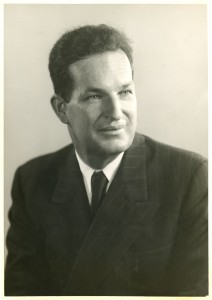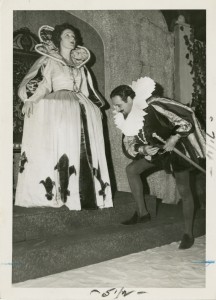It’s St. Patrick’s Day, so lots of people are wearing green. But at UNC, we’re celebrating another kind of Green—playwright Paul Green, who was born 120 years ago today.

Paul Green, born in Lillington, North Carolina, enrolled at UNC in 1916. However, his academic career was interrupted by World War I—he enlisted in 1917 and served overseas before returning to UNC in 1919. During his time at UNC, he was a student of Fredrick Koch, the head of the UNC Department of Dramatic Arts and the founder of the Carolina Playmakers. He graduated in 1922 with a degree in philosophy. The same year, he married a fellow student of Koch, Elizabeth Lay. In 1923, after his graduate studies, Green returned to UNC as a professor of philosophy.
During this time, Green published many acclaimed works, including In Abraham’s Bosom (1929), for which he won the Pulitzer Prize for Drama, The House of Connelly (1931) , Roll Sweet Chariot (1935), and Johnny Johnson (1937), which featured music by Kurt Weill. In 1941, he collaborated with Richard Wright to adapt Wright’s Native Son for the stage. Many of his works addressed themes of racism, and poverty, and war, reflecting his lifelong activism for human rights.

While Green’s work was well-received on New York stages, one of his greatest contributions to American theatre happened far from Broadway. In 1937, he published The Lost Colony, a “symphonic drama” about the ill-fated Roanoke Island Colony to be performed on the island itself, off the coast of North Carolina. The play, first performed in 1937 as part of the celebration of the 350th anniversary of Virginia Dare’s birth, is still running today. Having only suspended production during the years of World War II, it is the longest-running outdoor drama in the country. The Lost Colony established the genre of outdoor drama in the United States, and Green went on to write 14 more plays of this type.
From 1939 to 1944, Green worked as a professor of dramatic arts at UNC, then devoted himself solely to writing. His work includes not only plays but essays, short stories, screenplays, radio dramas, two novels, and music.
In 1968, UNC built the Paul Green Theatre, which is named in his honor. In 1979, Green was named North Carolina Dramatist Laureate. After his death in 1981, Green was inducted into the Theatre Hall of Fame (1993) and the North Carolina Literary Hall of Fame (1996), reflecting his impact on the literary world on both a national and local level.
